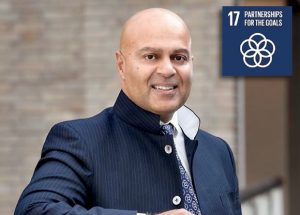Ameet Nathwani: Big Pharma, Big Changes to Traditional Ways of Thinking

Ameet Nathwani
Big Pharma might not be the obvious choice for tech talent looking for a new home or project — but Ameet Nathwani is hoping to change that.
Over his career, UK citizen Nathwani, who is based in Paris, has gained a comprehensive understanding of the healthcare industry. His experience ranges from providing individual patient care and pharmaceutical research to managing global health initiatives. He rose through the ranks at Novartis, one of the world’s largest pharmaceutical companies, and was a driving force behind the company’s digital health strategies.
In 2016, Nathwani was appointed as the chief medical officer and executive vice-president of medical at Sanofi, the global life-sciences company pushing innovation for improved healthcare solutions. In addition to his other roles and responsibilities, Nathwani was recently appointed Sanofi’s chief digital officer.
In the latter role, Nathwani networks with promising tech companies — large and small — to pose the question: “What would you do differently to address our problems?”
He’s reframed the company’s challenges as an open-call for collaborative partnerships. Nathwani makes the pitch at tech conferences such as the CES international consumer electronics show in Las Vegas, the annual VivaTech in Paris, StartUp Health in San Francisco, and Stanford University’s LIGHT Forum (Leaders in Global Healthcare and Technology).
“I think that healthcare is changing very rapidly.”
He says the conferences are one of the most uplifting and energising aspects of his new role, presenting him with an ideal opportunity to immerse himself in the health-tech “ecosystem of innovation”. Nathwani is taking the company from analogue past to digital future, and conference participation is a crucial tactic for the recruitment of top tech talent.
“It’s very hard to attract entrepreneurial, techie individuals and data people into big pharma,” Nathwani said in an interview at StartUp Health last year, “because nobody wants to work for an analogue-based company.” Sanofi employs more than 100,000 people, providing healthcare solutions in 170 countries. The company has put together a 20-strong team, with Nathwani at the helm, to usher-in the digital health era.
Nathwani believes data will be key factor in the transformation of the company’s organisational structure — and the industry as a whole.
“I think that healthcare is changing very rapidly,” he said, citing the increased accessibility of genomics, proteomics, and transcriptomics. “The data are getting cheaper, and in the healthcare environment, data are the new healthcare currency.”
Nathwani hopes to see patients own their personal health data — and reap the benefits. He envisions a world where patients armed with health data from wearables can share them with their doctors or commoditise them through voluntary participation in scientific research or clinical trials. Privacy concerns present a possible challenge, but blockchain technology could be used to protect users’ personal information.
The shift has already begun, he says, citing more than 40 “virtual hospitals” in the US and 150 “cloud hospitals” in China. “Our problem is that our industry hasn’t necessarily rapidly adapted to it, because there are lots of regulatory constraints, people are worried about privacy, and the regulations. But I think all of that’s changing.”
As regulators scramble to play catch-up to consumer demand for health-tech, Nathwani challenges the industry to push for digital healthcare as the new standard. The industry’s lingering attachment to the analogue system, particularly in expensive and extensive clinical trials, baffles him.
Nathwani says it takes about $1.6bn, and around eight years, to develop a drug — and it’s rare that the finished product will ever pay-back that investment in full. Traditional clinical trials also require that the test subjects make numerous physical visits to the clinical facility. Nathwani proposes a complete and fundamental shift, where AI and telehealth can slash the cost, time and effort required to research and develop new treatments.
“I think the more the patient gets empowered and demands a different level of care, a level of individualisation, and a participation in the innovation, that will force industry anyway, to change.”
You may have an interest in also reading…
Dieck-Assad, Academic at the Heart of Government
Dr. Maria de Lourdes Dieck-Assad is the rector of EGADE, one of Latin America’s leading business schools. It is always
Mohamed Al Jaber: The Arabs and Technology
Mohamed Al Jaber, born in Jeddah in 1959, is a UNESCO special envoy who likes constructive dialogue and so do
Mukhisa Kituyi, UNCTAD: Sustainable Stock Exchanges and the 21st Century Challenge for Global Finance
Faced with common global economic, social, and environmental challenges, the international community is in the process of defining a set















































































